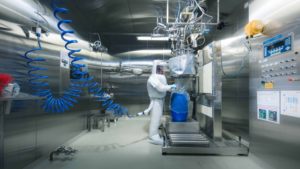Palbociclib companion biomarker unraveled
Researchers at the Universities of Dundee and Newcastle have identified a previously unknown target for the breast cancer drug palbociclib, which can be used to identify treatment responders.
Investigating the drug’s mode of action the researchers headed by Matthias Trost and Mikael Björklund identified the proteasome as new target of palbociclib, a treatment of advanced estrogen-receptor-positive breast cancer. The alternative path of how the palbociclib drives malignant cells into senescence could and identify patients that would profit most from this medication, they report in the EMBO Journal.
Palbociclib has been designed to thwart tumor growth by preventing key molecules of cell cycle progression from doing their job. Specifically, it inhibits cyclin-dependent kinase 4 (CDK4) and closely related CDK6; two factors that are essential to drive cells into DNA replication phase. However, recent observations indicate that palbociclib induces a more complete arrest than what can be achieved by blocking CDK4/6. Cells treated with palbociclib irreversibly withdraw from the cell division cycle and enter a state referred to as cellular senescence. Using the novel method of thermal proteome profiling to detect changes in thermal stability of cellular proteins triggered by palbociclib, the researchers found that palbociclib induced substantial changes in the proteasome, the protein complex degrading unneeded or damaged proteins. More specifically, palbociclib dissociates the proteasomal component ECM29. Once freed, the proteasome degrades proteins required for cell cycle progression, thus driving cells into senescence. While it was known that palbociclib stalls proliferation by inhibiting CDK4/6, inducing proteasomal activity may be an additional mechanism that ensures the completeness of the cell cycle arrest, says study leader Björklund. The discovery that palbociclib can activate proteasomal activity is important when considering potential drug combinations to treat breast cancer. Our work suggests that proteasome inhibitors and palbociclib are a not a good combination, given that they act in opposite direction, says co-author Trost. The researchers also found that, at least for certain types of breast cancer, patients with low ECM29 levels had longer relapse-free survival times. ECM29 possibly could be a biomarker for predicting the responsiveness of patients to palbociclib. The drug would probably be more beneficial in patients with high ECM29 levels, believes Trost.


 ©FabienMalot
©FabienMalot Lonza Group
Lonza Group Vetter Pharma
Vetter Pharma